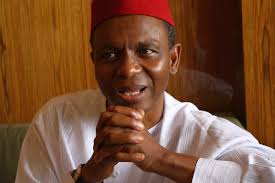
By Alexis Akwagyiram
KADUNA, Nigeria (Reuters) – Nigeria’s northern Kaduna state is close to agreeing a $625 million deal with an Indian consortium to build a light railway and also plans two new power plants, its governor said.
Development in Africa’s biggest economy has been held back for decades by a mismanagement, graft and lack of investment in its road, rail and power network.
Northern states, many of which have suffered a seven-year insurgency by Islamist militant group Boko Haram, have lagged behind the oil-producing south in terms of development, which has helped radicals recruit poor youths.
Nasir El-Rufai, governor of one of the largest northern states Kaduna said a deal to build a 44 km-long light rail line in the state had almost been reached.
“We have gone through a procurement process. We are on the verge of concluding agreement with an Indian consortium, Indo-Kaduna Metro joint venture,” he said in an interview, adding that rail consultant Systra and Indian power firm Skipper were part of the project.
“This is going to be funded by the Indian Exim bank, $625 million. The application is already being processed by the Indian exim bank. It is more or less a done deal,” he added, without naming more firms involved.
The governor, one of the most high-profile members of the ruling All Progressives Congress (APC) party, said work would begin in January lasting for 30 months.
FARMING
President Muhammadu Buhari has prioritised infrastructure spending but weak oil prices have left it struggling to fund a record 6.06 trillion naira ($20 billion) 2016 budget.
Buhari’s administration wants to boost manufacturing to cut the country’s reliance on costly imports and lower unemployment.
But chronic power shortages remain a major obstacle in a nation that produces less than 4,000 megawatts (MW) but requires 10 times that to guarantee power for its 180 million people.
El-Rufai said the state wanted to build two power plants to encourage investment and revive Kaduna’s textile industry, whose heyday was in the 1960s and 70s. “Most of the textile factories went down when electricity became too unreliable.”
Some 250 megawatts would be supplied by a power plant he said was “about 95 percent complete” using a mix of gas, crude oil and diesel. A hydroelectric power plant elsewhere in the state would provide another 30 MW.
He added the state had signed three solar power purchase deals that would each produce 100 MW-200 MW and were expected to be operational in the last quarter of 2017.
In line with Buhari’s emphasis on agriculture, a mainstay before the discovery of oil, El-Rufai said his state had launched a wheat farming programme.
“In a state where 89 percent of the population is below 35, the most important agenda items for us is jobs,” he said.
Under the programme, 5,000 young adults would receive one hectare each of farmland, seeds, fertiliser to produce wheat for Flour Mills of Nigeria.
($1 = 305.2500 naira)
(Editing by Ulf Laessing and David Evans)